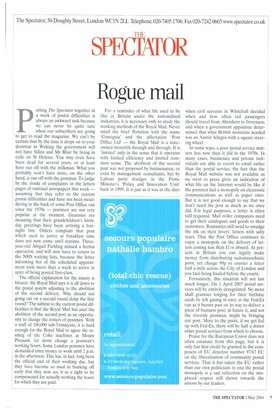Rogue mail
utting The Spectator together in a week of postal difficulties is always an awkward task because we can never be quite sure when our subscribers are going
to get to read the magazine. We can't be certain that by the time it drops on to your doormat in Woking the government will not have fallen and Mr Blair be living in exile on St Helena. You may even have been dead for several years, or at least have run off with the milkman. What you probably won't have done, on the other hand, is run off with the postman. To judge by the tirade of complaints in the letters pages of national newspapers this week — assuming that they refer to the current postal difficulties and have not been mouldering in the back of some Post Office van since the 1970s — postmen are not very popular at the moment. Grannies are moaning that their grandchildren's birthday greetings have been arriving a fortnight late. Others complain that post which used to arrive at breakfast time does not now come until teatime. Threeyear-old Abigail Fielding missed a hernia operation, and will now have to return to the NHS waiting lists, because the letter informing her of the scheduled appointment took more than a week to arrive in spite of being posted first-class.
The official explanation for the misery is bizarre: the Royal Mail says it is all down to the postal system adjusting to the abolition of the second delivery. Why should not going out on a second round delay the first round? The subtext to the current postal difficulties is that the Royal Mail has used the abolition of the second post as an opportunity to change the rosters of postmen. With a staff of 180,000 sub-Trotskyists, it is hard enough for the Royal Mail to agree the resiting of the Coke machines at Mount Pleasant, let alone change a postman's working hours. Some London postmen have demanded extra money to work until 2 p.m. in the afternoon. This has, in fact, long been the official end of their working day, but they have become so used to bunking off early that they now see it as a right to be compensated for actually working the hours for which they are paid. For a reminder of what life used to be like in Britain under the nationalised industries, it is necessary only to study the working methods of the Royal Mail. Never mind the brief flirtation with the name 'Consignia' and the affectation 'Post Office Ltd' — the Royal Mail is a stateowned monolith through and through. It is limited' only in the sense that it operates with limited efficiency and limited common sense. The abolition of the second post was not proposed by businessmen, or even by management consultants, but by Labour party drudges in the Prime Minister's 'Policy and Innovation Unit' back in 1999. It is just as it was in the days when civil servants in Whitehall decided when and how often rail passengers should travel from Aberdeen to Inverness, and when a government appointee determined that what British motorists needed was an Austin Allegro with a square steering wheel.
In some ways, a poor postal service matters less now than it did in the 1970s. In many cases, businesses and private individuals are able to resort to email rather than the postal service; the fact that the Royal Mail website was not available as we went to press gives an indication of what life on the Internet would be like if the postmen had a monopoly on electronic communications as well as paper ones. But it is not good enough to say that we don't need the post as much as we once did. For legal purposes, a letter is often still required. Mail order companies need to get their catalogues and goods to their customers. Romantics still need to smudge the ink on their lovers' letters with salty tears. That the Post Office continues to enjoy a monopoly on the delivery of letters costing less than /1 is absurd. At present in Britain you can legally make money from distributing sadomasochistic porn, yet charge 99p to courier a letter half a mile across the City of London and you face being hauled before the courts.
Fortunately, this situation will not last much longer. On 1 April 2007 postal services will be entirely deregulated. No more shall grannies longing for their birthday cards be left gazing in envy at the Fed-Ex van as it buzzes past on its way to deliver a piece of business post; in future it, and not the slovenly postman, might be bringing our post. More to the point, if we get fed up with Fed-Ex. there will be half a dozen other postal services from which to choose.
Praise for the European Union does not often emanate from this page, but it is only fair that credit be granted to the composers of EU directive number 97/67 EC on the liberalisation of community postal services. That it has taken the EU rather than our own politicians to end the postal monopoly is a sad reflection on the misplaced respect still shown towards the unions by our leaders.


































































 Previous page
Previous page